But many of these same companies aren’t protecting themselves from another potential threat to their business, that of bad debts.
The benefits of bad-debt insurance, also called credit insurance, are many.
6 Ways It Might Help You
1. Catastrophic loss protection // If receivables represent a significant percentage of your balance sheet, a default on these receivables could be disastrous. Even with the most diligent receivables monitoring, a positive result is never a guarantee.
2. Safer sales expansion // Are you trying to expand your credit lines with existing customers or extend more competitive credit terms to new customers? If so, the use of credit insurance allows you to grow with less risk.
3. The ability to borrow more from banks // Whose bank wouldn’t view this type of protection a benefit when considering a larger line of credit?
4. More information on customers’ creditworthiness // When you acquire bad-debt coverage, an insurer will examine your company’s financial statements, including your receivables and past payment history. They also will monitor the credit ratings of your current and potential customers. The insurers use national databases to do this, and can provide guidance about extending more credit, pulling back or not extending credit at all.
5. Less need to maintain a large reserve to cover bad debts // What if you took your bad-debt reserves and put that back into income?
6. Avoid an unexpected impact on your business // How much do you have to produce in sales to make up for that lost receivable? It depends on your margin, but in many businesses, the loss of a bad debt can take years to make up in additional sales.
Who Needs Bad-Debt Insurance?
The companies most susceptible to a bad-debt loss include small to medium-size manufacturers, wholesalers and service businesses that sell to a narrow group of large customers, or sell to only one customer, or even to customers that are in a limited geographical area.
These companies usually have a growing sales volume—but may be insufficiently capitalized, which could make them more vulnerable to the loss of an uncollectable receivable.
Bad-debt insurance policies are custom-built for a company and are based on their specific level of vulnerability. The degree of that vulnerability depends on the industry, number of years in business, equity position, existing assets and liabilities, and other factors.
Since these are custom policies, built for a specific business, the premiums differ as well. But, generally for a percentage of sales, a company can guarantee that its losses from bad debts do not exceed a set amount in a given year.
Not all businesses can qualify for this insurance, and some businesses have absolutely no need for it. But for those manufacturers, wholesalers, distributors and service companies that are especially susceptible to devastating bad-debt losses, credit insurance can be a welcome cost of expanding and maintaining their business.

